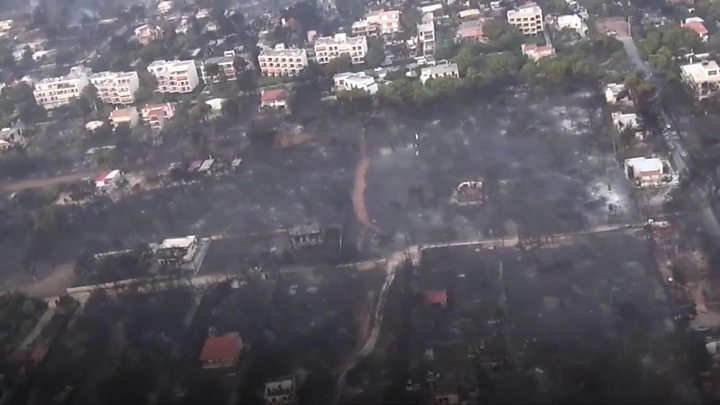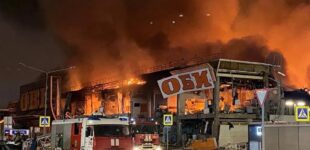Greece wildfires: Search for missing family members after 80 dead
 Media playback is unsupported on your device
Media playback is unsupported on your deviceGreek authorities are looking for dozens of people missing after the deadly wildfires near Athens.
At least 80 people have died, and a search continues for survivors who fled the blaze, including those who took to the sea.
High winds spread the fire, trapping many in homes and vehicles and forcing others into the water as they tried to escape the flames.
The fire is now widely reported to be the deadliest on record in Greece.
Prime Minister Alexis Tsipras has declared three days of mourning.
One father, Yiannis Philippopoulos, told Greek television his nine-year-old twin girls were still missing.
He said he had seen his daughters, Sophia and Vasiliki, alive on TV news footage as they got off a fishing boat that had rescued them. But he has not since heard from them or their grandparents, who had been with them earlier that day.
- British man in hospital after Greek fires
There is no formal count of the missing. The fire brigade has received dozens of calls, but is unable to verify the exact number.
Skip Twitter post by @GavinLeeBBC
Greek media is reporting that police are questioning 4 suspects in connection with the #Greek wild fires. It’s understood that more than 40 people are still missing. Here in #Mati this morning, people are searching for dozens of loved ones still missing. pic.twitter.com/1QtV79Vc8k
— Gavin Lee (@GavinLeeBBC) July 25, 2018
Report
End of Twitter post by @GavinLeeBBC
Relatives of those reported missing have posted photographs of more than 30 people online in the hope of tracing their whereabouts.
Coastal patrol boats combed the shoreline on Wednesday, searching for survivors and bodies, while rescue teams searched houses and cars.
The mayor of Rafina, Evangelos Bournous, has told the BBC that the dead could exceed 100.
The number of injured, meanwhile, continues to grow, and stands at more than 180, including two dozen or so children. Tourists were also caught up in the blaze, including one British man who was treated for burns.
Others have been evacuated to temporary accommodation.
Final embrace
On Tuesday, the bodies of 26 adults and children who apparently died embracing each other were found on a cliff top.
"They had tried to find an escape route but unfortunately these people and their kids didn't make it in time. Instinctively, seeing the end nearing, they embraced, " Nikos Economopoulos, head of Greece's Red Cross, said.
Hundreds of firefighters had battled the flames on Monday night amid winds of up to 100km/h (60mph).
- From the scene: Families left homeless in Mati
- In pictures: Wildfire devastation
- 'A friend died in the sea' - Eyewitness accounts
Among those killed as the fires swept Eastern Attica were a Belgian tourist and a Polish woman and her son.
More than 70 people were still being treated in hospital on Wednesday, and 10 were in a serious condition, Greek reports said.
Prime Minister Alexis Tsipras has declared a state of emergency in Attica, saying all emergency services have been mobilised.
Italy, Germany, Poland and France have all sent help in the form of planes, vehicles and firefighters, while Spain, Turkey, and Cyprus have also offered assistance.
The government in Athens as well as emergency services have faced claims that their response to Monday's emergency was too slow.
A Supreme Court prosecutor has ordered a probe into the cause of the fire, amid allegations that there was no evacuation plan in place.
'Biblical catastrophe'
The seaside resort of Mati is popular with foreign tourists and locals, especially pensioners and children attending holiday camps.
Survivor Kostas Laganos said: "It burned our backs and we dived into the water... I said: 'My God, we must run to save ourselves.'"
George Vokas, whose family also escaped by sea, told the BBC that two women he had tried to help had died in his arms.
"We're talking about a biblical catastrophe in this wonderful area of Mati," he said.
Greek reports suggested that 1,500 homes had been damaged and many had been destroyed.
Charred bodies lay just 15m (50ft) from the sea, photographer Pantelis Saitas told the Athens-Macedonian News Agency.
What caused the fires?
Fires are a recurring problem during the hot, dry summer months in Attica.
Officials have suggested the current blazes may have been started by arsonists looking to loot abandoned homes.
- The photos that explain the world's wildfires
- Reality Check: Mapping the global heatwave
- Five places that have just broken heat records
"Fifteen fires were started simultaneously on three different fronts in Athens," said government spokesman Dimitris Tzanakopoulos.
Greece, he added, had requested drones from the US to "detect any suspicious activity".
Greece's last major fire disaster was in 2007, when 77 people were killed in the southern Peloponnese peninsula.
Wildfires are a major concern across Europe this summer. Sweden has also battled fires the length of the country, while Latvian authorities suspect arson was behind a major peat and forest fire in Valdgale County that burned for days.
The serious nature of such fires and their wide geographical spread has led to speculation that climate change may be the cause.
While no individual weather event can be linked to climate change, a general correlation does exist between warmer global temperatures and the dry conditions that can spark several dangerous fires at once.
Are you in Athens? How have you been affected by the wildfires? Email haveyoursay@bbc.co.uk.
Please include a contact number if you are willing to speak to a BBC journalist. You can also contact us in the following ways:
- WhatsApp: +44 7555 173285
- Tweet: @BBC_HaveYourSay
- Send pictures/video to yourpics@bbc.co.uk
- Upload your pictures / video here
- Text an SMS or MMS to 61124 or +44 7624 800 100
- Please read our terms & conditions and privacy policy
Or use the form below
Your contact details Name (optional) Your E-mail address (required) Town & Country (optional) Your telephone number (optional) Comments (required)
If you are happy to be contacted by a BBC journalist please leave a telephone number that we can contact you on. In some cases a selection of your comments will be published, displaying your name as you provide it and location, unless you state otherwise. Your contact details will never be published. When sending us pictures, video or eyewitness accounts at no time should you endanger yourself or others, take any unnecessary risks or infringe any laws. Please ensure you have read the terms and conditions.
Terms and conditions
The BBC's Privacy Policy


